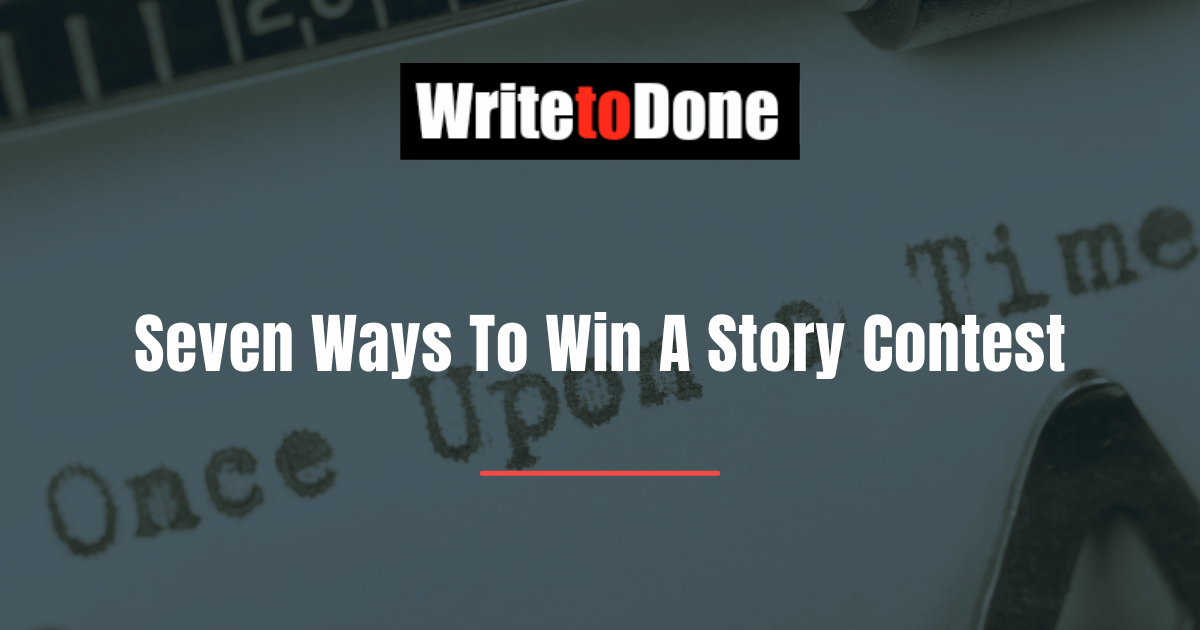Would You Like to Win a Short Story Contest?
What do judges look for when awarding prizes in a story contest?
You’d expect every reader to bring their prejudices to the table – and they do – but professional judges usually agree to a remarkable degree on which stories merit an award.
How do I know? I’ve just judged several hundred entries in the Writers’ Village international short fiction contest.
To ensure fairness, I then submitted the shortlisted entries to a further panel of judges, all acclaimed authors. Their verdicts were almost identical.
How did they select the winners, among so many excellent stories?
The judges were not greatly moved by lyrical language, snappy dialogue or deep insights into the human condition. They looked for evidence of structure. Provided a story was competent in other respects, its structure, or lack of it, was the deciding factor.
How can you strengthen story structure? Ask these seven key questions of your story – and you’ll know!
1. Have you focused on just one protagonist?
A short story should have just one protagonist whose viewpoint the reader will occupy. A story may be told by several narrators, or through more than one point-of-view (pov), but one protagonist must clearly predominate to sustain the reader’s engagement in the story.
Chaucer told The Canterbury Tales – a collection of short stories – through 24 different points of view, but the presence of a single protagonist, the host Harry Bailey, is always implicit.
2. Do you bring on the protagonist quickly?
The main character should appear in the first 400 words of a short story or no later than page one. Readers bond with the first strong character they meet. It’s important that the first person they meet is not a bit-player who subsequently disappears.
3. Is conflict introduced almost at once?
The protagonist should be involved in one or more meaningful conflicts almost at once. The conflict(s) may be physical, emotional or psychological, but they must represent two or more forces opposed within the protagonist’s mind.
The conflicts in the stories of the late Tom Clancy might appear at times to be entirely military or physical, but the protagonists are simultaneously wrestling with inner conflicts such as self-doubt or divided loyalties.
4. Does your protagonist change?
The conflict must change the principal protagonist in some way; s/he should be a different person at the end of the story.
Stories presented as a serial may appeal because the reader knows the protagonist will not change their character from story to story. But s/he must still arrive at the end the story having learned something significantly new about themselves or human nature. Otherwise, the tale is a cartoon strip.
For example, Sherlock Holmes is a serial character. Nobody expects him to be a different person at the close of every conundrum he solves. But the stories usually end with him making some wise observation to Watson. The great detective has learned something new from each encounter and, to that degree, he has been changed. (Indeed, his meeting with Irene Adler in A Scandal in Bohemia radically changes his attitude towards women.)
5. Is there a single underlying theme?
Theme is the underlying significance of the plot. A short story should have just one prevailing theme, and a single master plot. All sub-plots, if any, and ensuing conflicts should support that theme.
The French scholar Georges Polti said there were only 36 master plots in all the stories of the world. For example, Polti’s first master plot involves a Persecutor, a Supplicant and a dubious Power which may favor one side or the other. Doesn’t that remind us of Shakespeare’s Merchant of Venice, where the merchant Antonio is persecuted by Shylock but saved, after Portia’s entreaties, by the Duke of Venice?
The theme of this master plot? The power of mercy over hate…
6. Does your story close by revisiting the theme?
The close of your story should revisit, in some way, its theme. The central problem may be resolved, or the tale might close upon a note of tantalizing ambiguity. There might even be an acceptance that the issue(s) will never be resolved, but it must return – no matter how obliquely – to the theme. If it doesn’t, there’s no closure.
Even Henry James’ The Turn of the Screw, which seems to end with no conclusion, does close. Because it returns the reader to the problem posed by the narrator at the start. What (really) is Truth? That problem defines the story’s master plot.
7. Have you engaged the primal emotions?
The theme must engage the protagonist’s, and, by extension, the reader’s, primal emotions or carnal drives. Defined in the crudest terms, these include sex (or procreation), physical survival (for self, family or tribe), emotional comfort (love, friendship and community), and spiritual survival or advancement.
The theme and ensuing conflicts in a strong story should involve one or more of these primal drives. If the protagonist is not personally threatened or engaged in these primal areas s/he must become emotionally involved with a character who is challenged in one or more of them.
For example, the crime stories of Kathy Reichs appear, at first glance, to involve no primal drive. They’re grim whodunits, escapist entertainment. But Reichs’ heroine, the forensic anthropologist Temperance Brennan, is obsessed with a passion to avenge the dead – to re-assert the values of a civilized community and so protect the ‘tribe’. That’s a primal drive.
The author can invoke a primal drive overtly, as in a suspense thriller, or tacitly, as in a literary story which fits into no obvious genre. But it must be done.
If your stories tick all these boxes, and are otherwise well-written, they deserve to be short-listed for an award.
If they don’t incorporate these elements, no tricks of plotting, characterization, dialogue or the like can help you. Because your stories will be dead. They won’t engage the reader.
Of course, there’s a lot more to writing great stories. No doubt, you can easily think of stories that broke each of these rules, yet won.
So why not share them? Or suggest other rules that win readers – and awards? Please leave a comment!

















